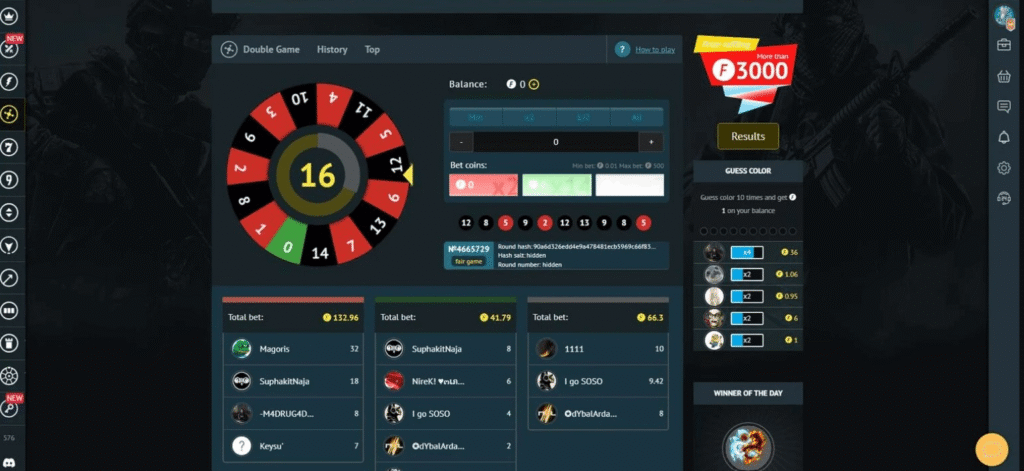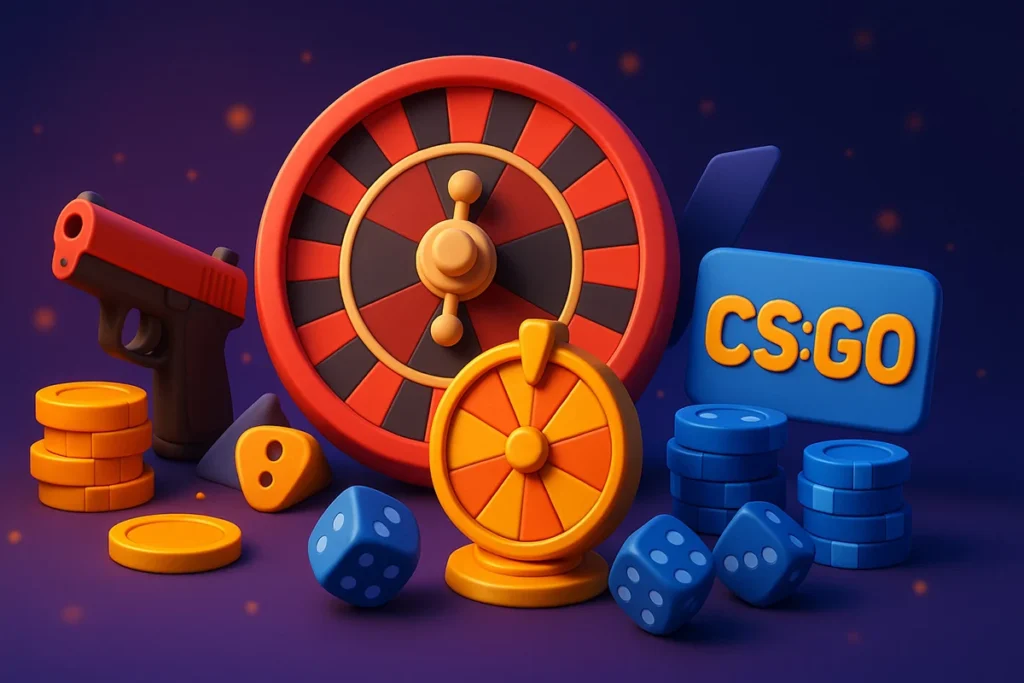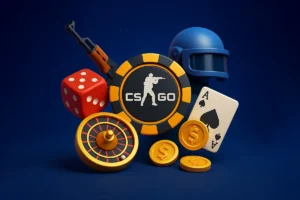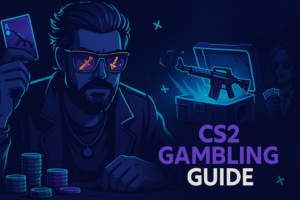What Is CS:GO/CS2 Roulette?
CS:GO and CS2 Roulette is basically the casino classic reimagined for Counter-Strike fans – only here, the chips on the table are your skins. Think about it: instead of stacking plastic tokens, you’re putting down your AK-47 skin, maybe a knife, or even a rare collectible worth more than a brand-new gaming rig. Each skin gets a cash value on the platform, and with that, you can drop your bet on red, black, or the high-risk, high-reward green. Then comes the spin – and in a heartbeat, you’ll either multiply your stash or watch it vanish.
The appeal is obvious. Roulette in CS:GO and CS2 is fast, flashy, and adrenaline-charged. One lucky spin can turn you into the star of the lobby; one bad call, and your whole inventory might go up in smoke. It’s that razor’s edge between risk and reward that keeps players glued to the wheel.
This scene really took off back in 2015, when the first wave of roulette sites hit the market. Since then, it’s exploded into a full-blown ecosystem, with dozens of platforms offering their own spins on the formula. And the launch of CS2? That only cranked the hype higher. With its sharper graphics and Source 2 engine, CS2 keeps skins at the heart of the economy – which means roulette and other gambling formats are here to stay.

The Evolution from CS:GO to CS2
Counter-Strike 2 (CS2) was not only a facelift for the game, but also a new format for player interaction and the skin economy. With the Source 2 engine, matches now feature updated graphics, improved textures and enhanced tick rates. The best part? The majority of skins from CS:GO will still be usable in CS2, which ensures skin value remains unchanged. The continuity of skin values and usability meant that roulette, and other skin gambling formats, were immediately transferrable and more attractive.
Roulette sites took advantage of the CS2 excitement environment right away. With a polished interface, modern animations, and smoother integrations, sites updated their roulette wheel to match the more modern graphics of the game. The result is more immersive roulette lobbies that not only look better, but are also a more secure and reliable format.
The combinations of nostalgia (for legacy CS:GO players) and modernization (for the new CS2 player) led to a surge of traffic and activity on roulette sites. The established player spins and flexes their legacy CS:GO skins and the new player spins and finds themselves in an attractive and engaging game of chance. The CS2 legacy continues roulette’s adventures but with renewed excitement.
Basics of CS:GO and CS2 Skins
How Skin Economy Powers Gambling
Skins are the heartbeat of CS:GO and CS2 gambling. They’re not just pretty paint jobs on your AK or gloves – they’re tradable digital assets with real cash value. Every skin has its own story: wear level, rarity, design, even special patterns that can skyrocket its price. That’s why some knives or gloves can sell for thousands, turning inventories into mini investment portfolios.
Roulette sites are taking advantage of this economy by allowing you to deposit your skins in return for site credits, essentially casino chips for roulette. The catch? Your actual bet is not a fixed value. Skin prices fluctuate daily based on supply and demand, which means that what you are betting today may be worth more or less tomorrow. Thus, the stakes are high and combined with market fluctuations, you feel the heart-pounding, thrill of betting.
In addition, the constant cycle of trading adds another dimension of strategy to your betting decisions as well. Is it better to hold that rare M9 Doppler you are hoping can appreciate in price or is the better play to throw it on red in hopes of doubling up ultimately in the end? That’s the tension endemic to these roulette sites that keep them running and engage millions of dollars worth of skins wagered per month.
Value Determination of Skins in Roulette
So, how is an item’s value determined by game sites? These sites utilize the Steam Community Market for up-to-the-minute data reporting, as well as third party pricing sites like BitSkins, and CSGOFloat. Multiple factors come together to make up the value you see:
- Float Value: How worn your skin looks, from Factory New to Battle-Scarred.
- Rarity Tier: From everyday Consumer Grade to ultra-rare Covert or Classified.
- Skin Type: Knives and gloves almost always dominate in value.
- Pattern ID: Unique details like Doppler “phases” or Blue Gem Karambits can spike worth.
- Popularity: If a skin’s trending, its price will rise fast.
Once that value is determined, the skin automatically converts into credits you can use on the wheel. Some websites take a very small cut as a fee; but in the end, the virtual cosmetic profile is now simply a higher value roulette chip – spinning once away from doubling up, or being gone.
Mechanics Behind CS:GO/CS2 Roulette
How the Game Is Played
Roulette in CS:GO and CS2 is fast-paced, simple, and designed to put your heart rate at an incline. You make your bet on the colors; red, black, or green, each color comes with a payout:
- Red → 2x your bet (often numbers 1–7)
- Black → 2x your bet (usually 8–14)
- Green → the jackpot – 14x or more, tied to that single “0” slot

Once bets are locked, the digital wheel starts to spin, and within seconds you will find out if you doubled up, hit the dream multiplier, or if your credits were burned. Who wouldn’t love adrenaline in a few clicks?
Several CS2 roulette websites turn up the heat by providing extra features: bonus multipliers, themed wheels, auto-bet strategies, and even custom ephemera for the roulette table. Some players will script auto-bets based on streaks of red or green, and others will go all-in – hunting for that green space. Whether you are strategic or impulsive, every spin can feel like a big deal.
Role of RNG (Random Number Generator)
Fairness is everything at a roulette table, and that’s where knowledgeable players trust in fair play, or RNG (Random Number Generator). RNG ensures that every spin will be random, which means there are no patterns, and no one’s manipulating the outcomes based on previous results. Legitimate operators will offer factual evidence using cryptographic hashing and “provably fair” systems that allow the player to verify the results after every spin.
Think of it as a receipt showing you were not cheated in the span of that spin. Your bet platform would provide a hash before each spin, and you would be able to verify if the spin aligned with the math. If, however, a platform does not provide the ability to verify fairness? Walk away….
At the end of the day, roulette combines pure luck with insane tension, and the only way to enjoy roulette in a safe manner is by playing at verified roulette websites.
Types of CS:GO & CS2 Roulette Games
🎡 Classic Roulette Format
This is where it all started. CS:GO/CS2 Roulette keeps the vibe of European roulette but trims it down for quick, adrenaline-fueled spins. Instead of 37 numbers, you’re looking at a 15-segment wheel: 7 red, 7 black, and that one elusive green.
- Red/Black → pays 2x your bet, solid and safe.
- Green (0) → the jackpot spot, usually 14x or higher, but insanely rare.
Because of this setup, the house edge is steeper than in traditional roulette, but that’s what fuels the hype. One spin can double your credits, or – if you’re bold enough to chase green – land you a payday big enough to flex in any lobby. Add flashy animations, suspenseful sound effects, or turbo modes for instant spins, and you’ve got pure casino chaos made for gamers.
💰 Jackpot and Coinflip Variants
Roulette might be the headliner, but most sites throw in Jackpot and Coinflip for variety.
- Jackpot: Everyone tosses skins into a communal pot. The bigger your contribution, the higher your odds. Drop in $50 worth of items into a $100 pot? You’ve got a 50/50 shot at snatching everything. Watching that wheel decide the winner feels like an esports final.
- Coinflip: A no-nonsense 1v1 duel. You and another player stake equal-value skins, flip the digital coin, and the winner walks away with both stacks. Quick, brutal, and addictive.
These modes hit differently. Roulette spreads risk; jackpot and coinflip are pure, high-stakes adrenaline.
🔒 Provably Fair Systems Explained
Trust is non-negotiable when skins worth thousands are on the line. That’s why the best roulette sites run on provably fair tech.
Here’s the simplified breakdown:
- The site generates a hidden server seed and shows you its hash upfront.
- You provide a client seed.
- Both seeds combine to generate the spin result.
- After the round, the seeds are revealed, and you can verify the math yourself.
It’s like having a built-in lie detector for every spin. If a site doesn’t let you check fairness, that’s your cue to back out – fast.
Choosing a Legit CS:GO/CS2 Roulette Site
Best CS:GO/CS2 Roulette Sites








Key Factors to Consider
There are a ton of sites for CS:GO and CS2 roulette, but let’s be honest, not every one of them is worth your skins or crypto. When it comes to choosing the right site, it can potentially make the difference between a large cashout or a full on rage quit from getting scammed. This is your checklist prior to even thinking of depositing:
- Licensing and Regulation: Sites with Curacao, Isle of Man, or Malta licenses aren’t flawless, but at least they’re accountable. No license? No thanks.
- Provably Fair Technology: If you can’t check the spin yourself, walk away. Transparency = trust.
- Security: SSL lock in the browser, 2FA login, and DDoS protection are bare minimums.
- Payment Methods: Crypto, PayPal, cards, and Steam skins should all be on the table.
- User Reviews: Check Reddit, Trustpilot, or Discord chatter. If payouts are shady or accounts keep getting blocked, that’s your cue to leave.
- Community Vibes: Live chat, active socials, or Twitch stream integration usually point to a legit, buzzing platform.
👉 Bottom line: don’t get blinded by flashy wheels or streamer hype. Do the homework, or risk losing your inventory in seconds.
Signs of a Scam Website
Scam sites are everywhere – slick designs on the outside, pure trap on the inside. Spot them fast with these red flags:
- Too-Good-To-Be-True Bonuses 🎁 – “Get 200% back instantly”? Yeah, sure. That’s bait.
- No Fairness Check ❌ – If there’s no provably fair system, the game’s probably rigged.
- Slow or Blocked Withdrawals 🕑 – If players keep shouting “where’s my payout?”, run.
- Bot-Loaded Chats 🤖 – If every user in chat is overly hyped or spamming wins, odds are they aren’t real.
- Phishing Clones 🕵️ – Some sites mimic legit platforms just to steal your login or trade link. Double-check the URL every time.
Depositing and Withdrawing Skins
How Deposits Work
Dropping your skins into a roulette site is way easier than most people think. Here’s how it usually goes down:
Login via Steam
Select Items
Value Assignment
Bot Trade Offer
Start Playing
⚡ First-time deposits often come with bonus credits or referral perks. Always check for promo codes before sending your items – it’s free money on the table.
Withdrawal Process Explained
Winning feels amazing – but nothing beats pulling your prize back into your Steam inventory. The withdrawal flow is usually just as simple:
- Request Withdrawal: Head to the withdrawal page and select the skins you want.
- Trade Bot Sends Offer: The site’s bot shoots you a Steam trade.
- Accept and Confirm: Accept through the Steam client or mobile app.
- Transaction Complete: Your shiny new skins appear in your inventory.
Things to keep in mind:
- Cooldowns: Some platforms add time locks before cashing out.
- Fees: Expect a small % cut on certain withdrawals..
- Inventory Sync: If the bot doesn’t have your chosen skin, you may need to pick another.
💡 Always test with a small withdrawal first. If the site handles it smoothly, then you can feel more confident playing bigger.
Strategies for Playing CS:GO/CS2 Roulette
Bankroll Management Tips
Roulette is all about chance – but if you don’t manage your bankroll, you’ll burn out faster than a T-side rush gone wrong. Here’s how smart players stay in the game longer:
- Set a Budget: Decide upfront how much you’re willing to lose. Treat it like buying a new skin: once it’s gone, it’s gone.
- Use a Percentage System: Never risk more than 5% of your balance in a single spin. Dropped $100 in skins? Stick to $5 bets.
- Avoid Tilt Betting: Losing streaks happen. Don’t double or triple bets just to “get it back.” That’s how inventories vanish.
- Withdraw Winnings Early: Score a big hit? Pocket part of it right away. Nothing stings more than giving it all back to the wheel.
- Set Time Limits: Long sessions cloud judgment. Breaks = better decisions.
👉 The golden rule: roulette is entertainment, not a paycheck. Bankroll discipline keeps it fun instead of frustrating.
Common Strategies Used by Players
Sure, roulette is RNG at its core, but players love to spice it up with strategies. Here are the most popular ones:
- Martingale Strategy: Double after every loss. One win and you’re back in profit. Sounds great… until you hit a brutal losing streak.
- Reverse Martingale: Double only after wins. Perfect for riding hot streaks, but one loss wipes momentum.
- Flat Betting: Keep bets the same every spin. Slow and steady – best for beginners testing the waters.
- Streak Chasing: If red shows up 3 times, bet black (or vice versa). No math behind it, just pure gut play.
- Green Sniping: Toss tiny bets on green every round. When it hits (14x+), it’s jackpot city.
⚡ Reality check: No system breaks the house edge. These tactics just add structure and a little extra thrill.
Risks and Legal Considerations
Is CS:GO/CS2 Roulette Legal?
Here’s the kicker: legality isn’t black and white – it’s fifty shades of gray. It all depends on where you’re playing from:
- United States: Skin gambling without a license? Pretty much illegal under federal law.
- Europe: Country by country. The UK, for example, demands a proper license for any real-money play (skins included).
- Asia: Places like China and South Korea are super strict. Zero tolerance on gambling.
- Australia & Canada: Technically illegal without licensing, but enforcement isn’t always airtight.
Back in 2016, Valve hammered several major sites after lawsuits, forcing many offshore. Today, most “reputable” platforms hide under offshore licenses to stay afloat.
Risks of Gambling Addiction
Now let’s get real – roulette is fun, but it can spiral fast. The speed of spins + flashy graphics + real-world skin value makes it dangerously addictive, especially for younger players.
Red flags to watch out for:
- Covering up your losses
- Chasing back what you lost with bigger bets
- Burning rent or grocery money on spins
- Feeling down or anxious after losing
- Telling yourself “just one more spin” and never stopping
And here’s the scary part: most sites barely check age, meaning teens can slip right in with valuable inventories.
If you catch yourself (or a friend) slipping, hit the brakes. Use platform tools like deposit caps or self-exclusion, or reach out to Gamblers Anonymous or your local helpline.
The Psychology Behind Skin Gambling
Why It’s Addictive
Skin gambling isn’t just a game – it’s a perfect storm of casino mechanics mixed with gaming hype. Here’s what makes it so sticky:
- Near Misses: That “almost landed on green” moment keeps you glued for another spin.
- Variable Rewards: Every round feels like opening a loot box – you never know if it’s trash or a jackpot.
- “Just a Skin” Illusion: Easy to forget that your “pixels” might actually be worth hundreds in real cash.
- Community Hype: Seeing a streamer pull a $1,000 knife makes you think, “why not me?”
- Gamified Features: Leaderboards, streak bonuses, and achievements turn it into more than gambling – it feels like a game mode.
Put it all together and you’ve got a reward loop that hits harder than any headshot. That’s why so many players keep spinning long after they planned to stop.
The Illusion of Control
Here’s the mind trick: players often think they’ve cracked the code. Drop at the “right moment,” chase patterns, or switch strategies – it feels like skill. But the truth? Roulette runs on RNG – every spin is pure randomness.
That false sense of control is what traps people. It convinces you your “system” works, until suddenly the bankroll is gone. The sooner you accept that roulette is luck, not skill, the safer (and saner) your experience will be.
⚡ Treat every spin like opening a case – unpredictable and out of your hands. Play for the thrill, not because you think you can “beat” the wheel.
Community and Social Aspects
Twitch Streams and Influencers
Twitch is basically the Vegas Strip of CS:GO/CS2 roulette. Streamers fire up flashy overlays, drop promo codes mid-spin, and go all-in on wild bets – and thousands tune in. It’s entertaining, no doubt, but it’s also shaping how players gamble.
Here’s the catch: many influencers play with sponsored balances. That means they’re risking the site’s money, not their own. Wins look effortless, losses don’t sting, and viewers get the illusion that hitting jackpots is normal. It’s easy to watch a streamer drop a $500 bet on green and think, “I could do that too.”
Reality check: big wins make for good content, not consistent results. If you’re watching for fun, enjoy the show. But don’t mirror streamer bets unless you’re ready for the crash landing.
Discord Servers and Forums
Outside of streams, the community lives on Discords and Reddit threads. These hubs buzz with:
- Tips and strategy debates
- Screenshots of insane wins (and salty losses)
- Referral codes, bonus hunts, and site reviews
- Warnings about shady platforms
At its best? You can get real tips and steer clear of scam sites more quickly than Googling by yourself. At its worst? The continual hype normalizes taking unwarranted risks and makes irresponsible betting seem like the expected behavior of a community.
⚡ Just stick to groups that provide a balanced mix of hype and realism. If every post is about “easy profit,” that’s your indicator.
The Role of Steam in Skin Gambling
How Steam Inventory Integration Works
Although Steam does not market itself as a gambling hall, the very nature of its inventory system and trading system lies at the foundation of skin gambling. Each knife, glove, or skin you own is a neat item in your Steam account. The gambling sites connect to your Steam account inventory to use trade bots – automated accounts to deposit and withdraw.
Here’s the flow in plain gamer terms:
- Login with Steam: You connect via Steam OpenID (no need to give away your password).
- Inventory Access: The site shows your skins and lets you pick what to wager.
- Trade Bot Interaction: A bot fires you a trade offer with the items you selected.
- Trade Confirmation: You approve it in your Steam app.
- Credit Received: Boom. Your “pixels” become gambling chips in seconds.
The process is polished, but it’s also a gamble. Scammers often mimic the bots with phishing links or trade offers that trick players into willingly giving up rare items. Steam’s API makes this process easy and creates an opportunity for exploitation.
Steam’s Position on Gambling
Here’s the issue: Valve wants nothing to do with gambling, at least formally. The Steam TOS prohibits inventories from being used commercially, which includes gambling sites. But the enforcement? Spotty at best.
Back in 2016, after lawsuits related to gambling with minors, Valve dropped the banhammer on some big sites. Since then, the company’s response has been to respond harder to press; tread lightly when legal pressure is absent.
That hands-off methodology is why skin gambling functions today. But it is a fragile quilt, one policy change or lawsuit could unplug the whole situation overnight. For now, Steam has its head turned, and players are feeling lucky- literally.
The Future of CS2 Roulette
Expected Changes in CS2 Gambling
With CS2 operating on the Source 2 engine, roulette sites will soon have a chance to upgrade their offerings. This technology is not only meant to deliver nicer skins in-game, but to enhance our gambling experiences into the next generation. Think:
- Faster Load Times: no more waiting for spins to process.
- Realistic Animations: every spin feels like a mini-cinematic.
- Skin customization upgrades – how skins look might start shifting their value on the market.
And we are just getting started. Sites could implement live-streaming roulette wheels, betting tools driven by AI prediction and statistics, or bonus mechanics based on CS2 stats or rank. Imagine winning more multipliers after you just clutched a win in CS2; that is the direction that we could go.
How Regulation Might Affect It
However, the counterpoint is this: the growth of CS2 gambling is putting it on the regulators’ radar. If the governments decide to clamp down, we could see:
- KYC checks (proof of age/ID before you play)
- Geo-blocks for restricted countries
- Limits on trades or deposits
- Mandatory gambling licenses for sites
This could create a stronger, safer, and more transparent gambling space – but could also make it less accessible for casual players. If there is a heavy clamp down, gambling is likely just to shift to underground or decentralized gambling environments where the risk is even greater.
👉 Bottom line: CS2 roulette is riding a wave of excitement, but its future is in the hands of Valve and regulators. For the time being, it is all out for CS2 roulette – but remember that the rules could change overnight.
Tips for Responsible Gambling
Setting Limits and Knowing When to Stop
Roulette should feel like a game, not a grind. To keep it fun (and safe), try these pro-player habits:
-
Set a Time Limit
Decide before you log in how long you’ll play. When the timer’s up, close it down – win or lose -
Use Only Disposable Income
Never touch rent, tuition, or borrowed cash. If you wouldn’t spend it on pizza or a night out, don’t gamble it -
Track Your Bets
Jot down deposits, wins, and losses. Seeing numbers on paper keeps you honest -
Know Your Triggers
Stress, boredom, or hype from friends? That’s when bad bets happen. Recognize it and step back -
Take Breaks
After a big win or painful loss, pause. Clearing your head saves your bankroll -
Turn Off Notifications
Turn off Discord pings and site alerts. Out of sight, out of mind
Helpful Tools and Resources
Most legit platforms include built-in tools to keep you balanced:
- Self-Exclusion: Block yourself temporarily (or permanently) if things get heavy.
- Deposit Limits: Cap how much you can spend in a day or week.
- Reality Checks: Automated pop-ups reminding you how long you’ve been spinning.
And if you feel gambling slipping out of control, there’s no shame in reaching out:
👉 Real pros know when to stop. Setting boundaries isn’t a weakness – it’s what keeps the game fun.
Final Thoughts
CS:GO and CS2 roulette is not the same as any other mini-game; it is an exhilarating initiative that combines risk and reward as the culture of gaming meets casino mechanics. The wheel spins rapidly, the lights flash, and you will feel the adrenaline of a clutch match. You may walk away from the wheel with a few pennies to the dollar, or you may walk away with a few skins worth hundreds – that is part of the experience.
But purely winning and belonging in the long-run is not just luck; winning is about control. Learn the mechanics of the wheel, understand the need for legit sites, develop your bankroll strategy, and finally treat each time you spin the wheel as entertainment vice a day’s pay. If you can keep that mentality, you can enjoy the entertainment without the serious consequences.
With CS2 developing the next iteration in the experience – expect more graphic enhancement and smarter sites for playing roulette and possibly tougher regulations. We could only hope for innovation… or we may have to expect more restrictions. Either way, the wheel keep turning.
⚠️ Every spin has its potential pitfalls and risk – losing money potentially cycling into gambling problems and legal issues depending on where you play roulette. Protect yourself: set strict limits; only gamble on trusted sites; and more importantly just walk away before the game plays you.






Comments